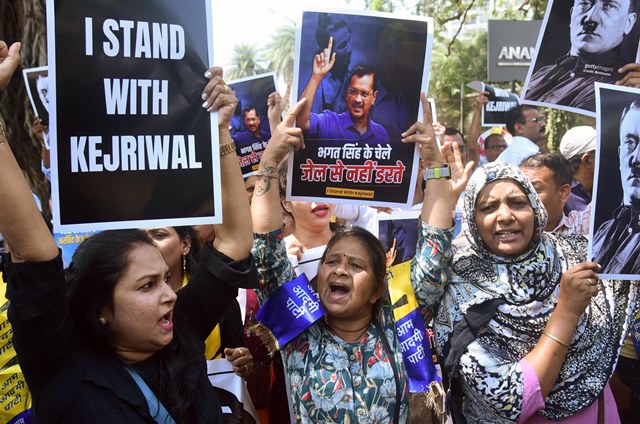
Will Kejriwal’s Arrest Make AAP More Powerful?
Approximately one year from now, when the state of Delhi holds its next assembly elections, how many of the 70 seats do you think the Aam Aadmi Party (AAP) will get? Here are some facts to help you with your estimate: Last time the Delhi elections took place, in 2020, AAP won 62 of them, while the Bharatiya Janata Party (BJP) won 8; and in the previous elections, in 2015, AAP won 67, while the BJP won 3. So how many seats do you think AAP will win in 2025?
It might seem a bit silly that I’m talking about an election that will probably not happen till February 2025, at a time when everything should really be focused on the big fat Indian elections that begin next month when nearly a billion of us will vote to elect 543 Members of Parliament. Then again, there will likely be few surprises when that long 44-day polling is over and the votes are counted. Unless something totally unforeseen happens, Prime Minister Narendra Modi and the National Democratic Alliance (NDA) are expected to sweep those elections and the only question is about whether they can get more than the 353 seats they won in 2019 and, if so, how many more.
Delhi’s next assembly election, though, is a more interesting subject to speculate about. As I write this, AAP’s national convenor and Delhi’s chief minister, Arvind Kejriwal, is in a Delhi prison after he was arrested on 21 March by the government’s Enforcement Department, which investigates economic crimes such as money laundering offences. The charges against Kejriwal, 55, and some of his senior party colleagues who are also incarcerated pending trial, involve alleged aberrations in the granting of liquor licences to private vendors in the state of Delhi. Even as AAP refutes those allegations and the ED continues its investigations, his arrest coming just before the parliamentary elections start has raised many questions.
Kejriwal’s AAP, a young party formed in 2012 out of a larger mass civil movement against corruption, has already blazed a remarkable political path. In Delhi, it has decisively won elections to the state assembly and Kejriwal has been chief minister since 2015 (also earlier for a year in 2013-14). In Punjab, in 2022, as a newcomer, the party won the state election with 92 of the 117 seats and has been running the state’s government there. It has just one seat in Lok Sabha and has not really fared too well in other states where it has contested elections but Kejriwal’s popularity as a politician and leader has been on the rise and AAP does have ambitions of emerging as a national party.
In recent months, arrests and investigations against opposition leaders by agencies of the government of India have caught the attention of those who follow Indian politics because of their timing and also because of the people that have been targeted. In an interview to Al-Jazeera news channel, the opposition leader and Trinamool Congress MP from West Bengal, Derek O’Brien alleged that 96% of the anti-corruption cases against politicians are against those from non-BJP opposition parties. He also alleged that most of these are “trumped-up charges” that miraculously go away when some of those charged defect to the BJP.
It is for the investigators and the judiciary to decide whether the charges against various politicians stick or not but the timing of some arrests may be more than mere coincidence. Kejriwal’s rise and the growing prominence of his party has clearly been a challenge for the BJP as well as the Congress. A first-generation politician from a middle-class family, Kejriwal, who has an engineering degree from one of India’s top technology institutes, quit a government job to join politics. Like Modi he doesn’t come from a political dynasty as many Indian political leaders, notably Rahul Gandhi of the Congress party, do.
His Aam Aadmi Party has the avowed mission of being dedicated to the cause of the common man and despite several constraints that his government faces because of Delhi’s special status as a state, its achievements are notable. Here are some of them: In education, the AAP government has focused on improving the quality of education in Delhi. Initiatives like mohalla schools and happiness classes have been implemented to enhance learning outcomes. In healthcare, the Delhi Arogya Kosh scheme provides free treatment to over five lakh citizens. In public transport, the addition of 1,650 electric buses to the public transport fleet aims to reduce pollution and improve mobility.
It’s not easy for the Delhi government to operate within constraints imposed by the special status of the National Capital Territory (NCT), where certain subjects such as policing, law and order, and land matters, fall under the jurisdiction of the central government. In addition, the NCT’s 33.8 million population (with a staggering 22,800 people per sq km) poses challenges related to infrastructure, traffic, and pollution management that are not easy to tackle.
Although AAP is part of an alliance of around 26 opposition parties, the badly-named Indian National Developmental Inclusive Alliance (I.N.D.I.A.), it is one of the few parties within that fold that can be expected to challenge the BJP’s formidable force in coming years. AAP may still be a small and young party but its leader, Kejriwal, has the charisma and voter-pulling power that few others among India’s opposition parties do. Many such as Mamata Banerjee of the Trinamool Congress in West Bengal have a sway over their own states but have been able to make no headway outside their fiefdoms. Kejriwal, who has led AAP to victory in Punjab, stands out among the others.
In Delhi, because of the state’s special status, Kejriwal and his AAP government have constantly sparred with the Lieutenant Governor of the state, who is, in effect, appointed by the Centre, and has discretionary powers over the subjects outside the state government’s jurisdiction. As a consequence, AAP and Kejriwal have become, from the point of view of the BJP, a thorn in its side.
One of the professed objectives of the Modi regime since it came to power in 2014 was to create an India or Bharat that is “free of the Congress party”. It is an objective that electorally it has achieved. In Parliament, the once powerful Congress party has just 50 of the 543 seats; and of the 28 Indian states, it is in power in only three.
With the Congress out of the way, could the BJP now be training its sights on other rising opposition parties such as AAP? Or could its recent crackdown on Kejriwal and other AAP leaders actually backfire and boost support for them? That brings us back to my earlier question: How many seats in the next Delhi elections do you think AAP will win? Any guesses?
For more details visit us: https://lokmarg.com/



